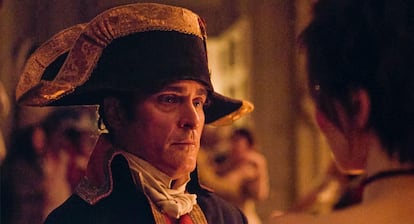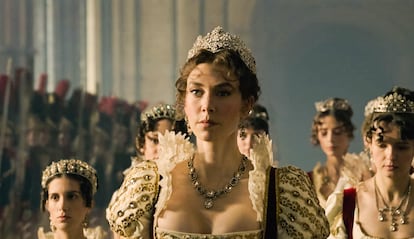Napoleon and Josephine, the toxic relationship mythologized by history
The premiere of Ridley Scott’s new blockbuster ‘Napoleon’ in November of this year will tell the life story of the French emperor and the darker side of his marriage to Josephine

“France, the Army, Josephine.” These were, supposedly, the last words of Napoleon Bonaparte when he died on the island of Saint Helena, one of the most isolated territories in the world, to which he had been exiled after his defeat and defenestration as Emperor of France. Three words that contributed to mythologize the relationship of the little general with his wife of 13 years. Just like the passionate letters he had sent her from Italy, where he went on his first major campaign, after marrying her, full of love and eroticism.
It seems, however, that despite the legend, the supposed great love story between Napoleon and Josephine was always more propaganda than reality. Many scholars and historians have denied the official story that the Napoleonic regime always sold: the one that said that while the hero triumphed on the battlefield against the enemies of the Republic, Josephine, his lover, and sweet wife, waited for him in Paris, longing for him from afar, embroidering by day and undoing it at night, like Ulysses’ darling Penelope.
The year of Napoleon?
Although we may not be aware of it yet, absorbed as we are by the battle of Barbie versus Oppenheimer, it is very possible that, cinematically, 2023 will be the year of Napoleon. The new film by Ridley Scott shines a spotlight on the French general’s life and his eventful relationship with Josephine.
The film stars Joaquin Phoenix in the role of Bonaparte and Vanessa Kirby, who played Princess Margaret in the first two seasons of The Crown, as Josephine. The film will premiere on November 22 and, although it is still a little far off, we can warm ourselves up for it by recalling the truth about one of the most famous romances in history.
The beginnings of a stormy romance
Napoleon and Josephine met in the busy, libertine salons of 1795, when the burning zeal of the French Revolution had already died down a bit and a new aristocracy was still doing more or less the same things the old one had done. At that time, Napoleon was nothing more than a 26-year-old soldier with more talent than money and newly acquired fame for having defended the government by leading a small army during the revolts of the monarchists against the revolutionary regime. She was six years older than him and had become, after her husband Viscount Alexandre de Beauharnais was guillotined, one of the best-known widows in Parisian society.
When Napoleon met Josephine, he was completely fascinated by her. Aided by Paul Barras, leader of the government at the time (and then one of Josephine’s many lovers), in just six months he married her in a civil ceremony at Paris City Hall. On the marriage certificate, both lied about their age: she took four years off and he added one.
Only two days after their wedding, Napoleon had to leave. In command of the Army of Italy, he ended up invading that country. These years were the beginning of the French army’s glory: the capture of Italy, the surrender of Austria. But while the soldier’s brain was busy planning tactics on the battlefield, his heart was thinking about Josephine. Napoleon wrote to her all the time, sometimes more than once a day. Letters full of love and lust that form the backbone of their legendary romance, which Ángeles Caso deeply analyzed in her book Napoleón y Josefina: Cartas, en el amor y en la guerra [Napoleon and Josephine: Letters, in love and in war].
In the letters, however, there were also reproaches from the future emperor regarding her prolonged silences. Once he had hit the road, she returned to her old ways: collecting lovers and living the high life in Paris. From time to time, however, he wrote to her declaring his “unconditional love.” Soon, he asked her to come and see him in Italy, where things were going great. She kept dragging her feet. It is said that Josephine even invented a pregnancy and, later, an abortion to justify staying in Paris. So desperate did the general become that he was about to abandon his armies in the middle of battle to return to his love, perhaps already suspecting that something strange was happening. This alerted the government and, faced with the danger that Josephine’s refusal to leave France would jeopardize the course of the war, Barras finally convinced (or forced) Josephine to travel to the arms of her husband. Of course, accompanied by her favorite lover of the moment, the soldier Hippolyte Charles.

Egypt, more infidelities, and the Empire
After the campaign in Italy, Napoleon and Josephine enjoyed a brief period of love in Paris, after which the general and his troops set out for the conquest of Egypt in order to protect French commercial interests and cut off the route to India, used by Great Britain, France’s greatest enemy. The situation with his wife, of course, repeated itself. Josephine continued with her romances, still very focused on Hippolyte. Napoleon continued to conquer territories for his country and, on this occasion also, stealing many of the archaeological jewels of antiquity that we can still admire today in the Louvre Museum.
It was in Egypt that one of the general’s trusted men finally told him about Josephine’s infidelities, which were already known throughout Paris. The news drove Napoleon crazy, and he immediately returned to France. Although mentally shattered, and despite Josephine’s fears, Napoleon did not ask for a divorce. Instead, he gradually drifted away from her, which had a curious effect: according to historical testimonies, from then on, she seemed to be the one who was jealous and in love with him, while he began to grow more distant and to take his own lovers.
Faced with this situation, she responded with emotional blackmail and spending exorbitant amounts of money on luxuries, jewelry, clothes, and renovations of her palaces, as Madame de Rémusat, lady-in-waiting of the future empress, tells in detail in her memoirs Las guerras privadas del clan Bonaparte: Memorias de una dama de palacio en la corte de Josefina y Napoleón Bonaparte [The Private Wars of the Bonaparte clan: Memoirs of a Lady of the Palace at the Court of Josephine and Napoleon Bonaparte]. On the other hand, the issue of the succession was becoming more and more important. Especially when Napoleon crowned himself emperor for life in 1805 at Notre Dame Cathedral in the presence of the Pope. Every emperor needs an heir, something he didn’t have.
However, the circus facing the gallery continued. Napoleon crowned his wife as empress, who also took advantage of the visit of the Supreme Pontiff to get married in the Church. A curious time to do so, since at that time the marriage was completely broken. There was shouting, arguments, and even physical violence. However, for years, no one considered a divorce. Josephine also seemed to have a special talent for being empress, and the people adored her.

Divorce and the Court of Josephine Bonaparte
The situation endured for four more years. The couple’s own private war reached a point of no return when Napoleon got one of Josephine’s ladies-in-waiting pregnant. Until then the soldier had thought that perhaps he was sterile and, therefore, it was impossible for him to have children with his wife. But the chance of having a successor by another woman hastened their separation.
The couple finally divorced in 1809, in the middle of one of the ugliest phases of the Napoleonic Wars and, especially, the Spanish War of Independence. Napoleon did not miss this opportunity to make a little propaganda and, incidentally, feed the legend of his great love story with Josephine. In a totally unprecedented maneuver, the couple appeared at a public event in which each of them read a declaration of devotion to the other, presenting the divorce as a sacrifice for the welfare of France, with the aim of finally getting the coveted heir.
Josephine’s parallel court
Some signs throughout this story seem to indicate that Napoleon’s feelings for Josephine never really changed, and that their estrangement and the deterioration of their relationship to intolerable levels was due more to spite than to a real falling out of love. For example, after his divorce, Napoleon never withdrew Josephine’s title of empress, nor her generous allowance. It is true that it was necessary for the emperor’s ex-wife to retain a certain dignity, but it does not seem that in that gesture there was not also a certain personal appreciation.
Napoleon quickly remarried. His new wife was Marie Louise of Austria, daughter of the King of Austria, Francis I, and belonged to the House of Habsburg. With her, in 1811 he finally managed to have the long-awaited heir, Napoleon François Joseph Charles Bonaparte, who is commonly known as Napoleon II. Little more can be said of the relationship with Marie Louise, about which Napoleon joked: “I married a womb.”
The end
Josephine died on May 29, 1814, as a result of complications from a common cold. She was only 50 years old, and her funeral was an event in Paris attended by more than 20,000 people. By then, Napoleon’s brilliant journey through the history of Europe was also ending. It seemed as if his success had been linked from the start to his relationship with Josephine. Defeated in Russia and repudiated by his own people, he abdicated as emperor after his defeat by Wellington at the Battle of Waterloo on June 18, 1815.
After that, the British sent him to the island of St. Helena where, for almost six years, he devoted himself to dictating his memoirs. Considering that he had been a man who had won so many battles, it is easy to imagine that during his reflections on St. Helena, he spent a lot of time thinking about his defeats. And perhaps the greatest of all happened not on the battlefield, but in his personal life. Hence, perhaps, the loss of his three great loves: “France, the Army, Josephine.”
Sign up for our weekly newsletter to get more English-language news coverage from EL PAÍS USA Edition
Tu suscripción se está usando en otro dispositivo
¿Quieres añadir otro usuario a tu suscripción?
Si continúas leyendo en este dispositivo, no se podrá leer en el otro.
FlechaTu suscripción se está usando en otro dispositivo y solo puedes acceder a EL PAÍS desde un dispositivo a la vez.
Si quieres compartir tu cuenta, cambia tu suscripción a la modalidad Premium, así podrás añadir otro usuario. Cada uno accederá con su propia cuenta de email, lo que os permitirá personalizar vuestra experiencia en EL PAÍS.
¿Tienes una suscripción de empresa? Accede aquí para contratar más cuentas.
En el caso de no saber quién está usando tu cuenta, te recomendamos cambiar tu contraseña aquí.
Si decides continuar compartiendo tu cuenta, este mensaje se mostrará en tu dispositivo y en el de la otra persona que está usando tu cuenta de forma indefinida, afectando a tu experiencia de lectura. Puedes consultar aquí los términos y condiciones de la suscripción digital.








































